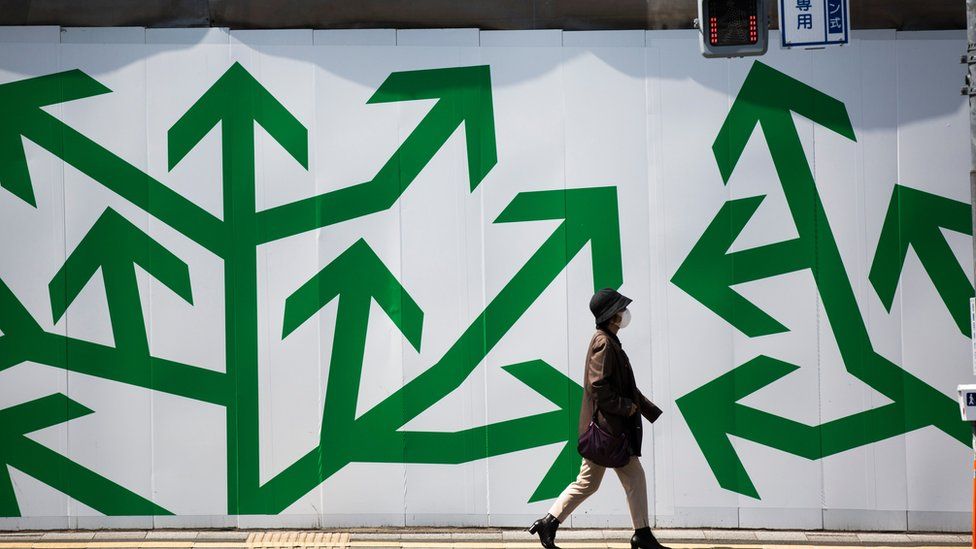The country where the streets clean themselves (or maybe not)
- Published

How well do you know Japan? Is the country so advanced that streets wash themselves?
Are cleaners so respected that they are paid the same as a government minister? And are trains so punctual that the total delays across the country last year were a mere six seconds?
The answers are likely to be "yes" on Arabic social media according to "Hassan" who started the Arabic hashtag "Myths about Japan", to dispel such fantastic and untrue stories.
Hassan, who prefers not to share his full name, works for Nippon.com, an online multi-lingual portal that says it's dedicated to presenting accurate information about the society and culture of Japan.
"I started the hashtag from our Arabic twitter account, @nippon_ar, about a year ago. But people only started noticing it few months ago," he says.
"We often use popular anime characters as GIFs to catch people's attention".
In one popular tweet, the hashtag took aim at a tweet of a photo said to show the Japanese energy minister publicly apologising for a 20 minute power cut by bowing for the same amount of time.
The photo was in fact of Honda's new chief executive at his first press conference in 2015.
Hassan put the record straight by re-tweeting the offending tweet and correctly identifying the photo's subject. One clue is the Honda logo in the background.
"1200 retweets for a myth! How many retweets for this correction?!" Hassan lamented in his tweet.
In several other responses, the hashtag has been used to explain that the Japanese can't self-print a new passport in three minutes (just yet) and nor can smokers in Japan light up at restaurants if they use special designated smoking pods.
In response to the latter "Myths About Japan" explained: "The photo is widely circulating as if it's from Japan, and it's got nothing to do with Japan!
"It's a Photoshop picture published several years ago by an American hoax news website saying that you can smoke marijuana at a McDonald's branch in Colorado. The Washington Post refuted it."
Misconceptions like this do not appear to be inspired by malice or mockery. They are more a symptom of an over-awed respect for Japan in Arabic-speaking countries.
It's not odd to find references to "Planet Japan" on Arabic social media when users are sharing "fun facts" they admire about the country. The saying goes that the country is so technologically and culturally advanced that it might as well be on a different planet.
But for Hassan, this perception creates false barriers between nations.
"We want Arabs to feel that Japan is a normal country and its people are like them. They have their good and bad.
"We believe Japanese culture has its rich aspects but the myths are a distortion"
Hassan explains the fake facts about Japan on social media also crop up in other languages like French and English. But he says noticeably more are shared by Arabic speakers on platforms like Twitter and Facebook.
Arab celebrities and verified news Twitter accounts didn't escape Hassan attention either.
Is that magnificent sculptured water fountain really in Japan as mentioned by one Jordanian verified news account?
It's in fact a 3D digital design lifted from the Instagram account of the American artist Chad Knight according to Hassan: "This fountain, which is being shared widely on social media does not exist in Japan or in the real world we live in."
And no, there's no "Teacher's Day" in Japan and students don't wash their teachers' feet, Hassan adds in another response to an MP in Kuwait.
So what's people's reactions been like to his corrections? Hassan says most are often shocked a "fact" they grew up is not true.
"Many are appreciative of our work and want more verified facts about the country. Others accuse us of ruining the perfect image they have had of Japan".
"One popular Arabic TV station once tweeted a photo of a meeting at the Communist Party in China as if it was at the Japanese parliament. This is how bad information about Japan is. This is why we exist".
Blog by Abdirahim Saeed
Do you have a story for BBC Trending? Email us.
You can follow BBC Trending on Twitter @BBCtrending, and find us on Facebook. All our stories are at bbc.com/trending.